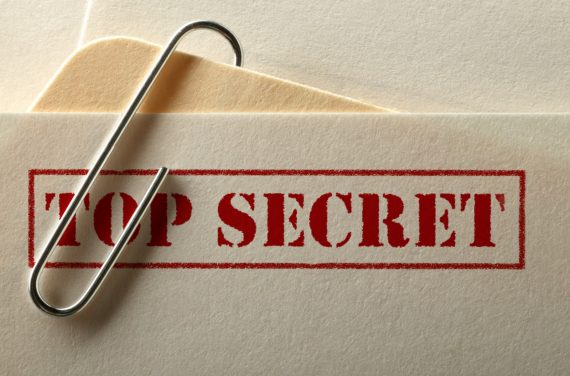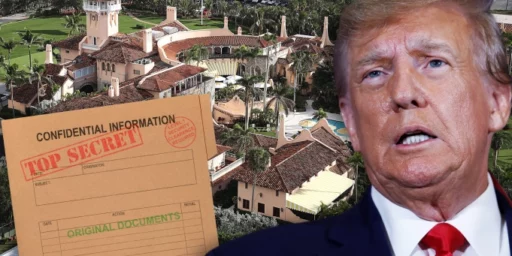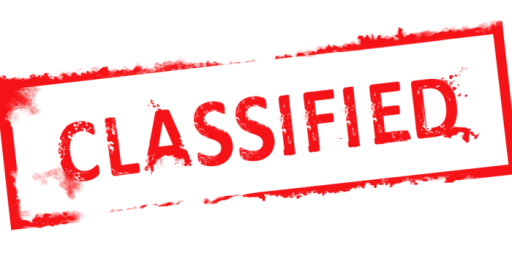Of Laws and Men
Our system lacks accountability.

My co-blogger James Joyner frequently notes a frustrating truth: it is highly unlikely that Donald Trump will be prosecuted for his actions while in the presidency. This is a result of norms that heavily dictate against using the legal system against political opponents and, just as importantly, the fact that laws are often not written in a way that malfeasance by a president is easily prosecuted. And, beyond that, when one person’s malfeasance is construed by political opponents as “just politics” the pathway to remedies in the legal system are simply limited. The recourse, therefore, is supposed to be at the ballot box.*
For example, while I think there are grounds to assert that Trump had substantial responsibility for what happened in the U.S. Capitol on 1/6, I have substantial doubts about there being a legal pathway to indictment, let alone prosecution. The law is just too nebulous and basic politics gets too heavily in the way.
But an emerging story about the handling of documents by the administration has led to discussions that perhaps Trump actually ran afoul of the Presidential Records Act of 1978. Unlike something like incitement charges, the document situation is easier to deal with than some of the other problematic behaviors of the 45th president, because it is harder to have a partisan spin rules like “can’t tear up official documents” (let alone flush them) and “everything has to be kept in the archive.” While I fully realize that partisan actors can find a way to spin anything, there is no avoiding the facts of tearing up official documents is fundamentally different than trying to parse if a clearly political speech was incitement or just hyperbolic.
Let’s consider this from WaPo: 15 boxes: Inside the long, strange trip of Trump’s classified records.
The tale of these 15 boxes — and the material contained within — underscores how defiantly and indiscriminately Trump violated the records law, which requires that the White House preserve all written communication related to a president’s official duties and then turn it over to the National Archives. Instead, starting in his presidency and continuing into his post-presidency, documents both classified and mundane — as well as official gifts, which are governed by similarly stringent rules — were treated with the same disregard and enveloped in the same chaos that characterized his term in office.
[…]
But it remains unclear what protocols were followed because, as one person familiar with the transfer said, “Nothing about this is normal.” Officials have not identified what company handled the Mar-a-Lago shipment.
“He would roll his eyes at the rules, so we did, too,” said Stephanie Grisham, the former Trump White House press secretary who has become an outspoken Trump critic after the Jan. 6 insurrection on the U.S. Capitol. “We weren’t going to get in trouble because he’s the president of the United States.”
Grisham, the author of “I’ll Take Your Questions Now: What I Saw at the Trump White House,” recalled one instance in which she expressed concern about violating the Hatch Act, which prohibits federal employees from engaging in some forms of political activity. Grisham said that Trump told her: “Who’s the boss of the Hatch Act? It’s me. So say whatever you want.”
That statement, which is emblematic of Trump’s behavior in office, is the direct opposite of the phrase “a government of laws, not of men” and, instead, is equivalent of Louis XIV’s famous utterance, L’état, c’est moi. It also, I would note, runs counter to the notion of “limited government.” (And yes, fully realize this is not the first time such facts have been obvious, nor even the most egregious example).
If the president can do whatever the president wants, then Hamilton basically got what he wanted, after all, an elected monarch (just with fixed terms).
That cavalier attitude about the rules extended to Trump’s treatment of documents, which he routinely ripped up and threw away, forcing aides to retrieve them and send to the White House Office of Records Management to be taped back together to comply with the Presidential Records Act.
Trump had a ripping process so distinctive that several aides instantly recalled it — two large, clean tears that left paper in quarters — and the remnants were strewn on desks, in trash cans and on floors, from the Oval Office to Air Force One. As president, Trump also regularly retired to his private residence with reams of official documents, often leaving them to pile up until records staff came searching for them.
Nonetheless:
Trump was warned by his first two chiefs of staff — Reince Priebus and John F. Kelly — about complying with the records act, as well as by Donald McGahn, his White House counsel.
In regards to the 15 boxes and the post-presidency period:
Ultimately, Trump arrived at Mar-a-Lago with the array of documents and other items that should have been turned over to the Archives. In a statement, the Archives said Trump’s representatives have said they are “continuing to search” for documents that belong to the government.
[…]
“The Clintons had to return gifts, and there were lots of presidents who didn’t write anything down, or not keeping emails, but I don’t know of a story since 1978 of a president leaving with this much material,” said Julian Zelizer, a presidential historian at Princeton University. “I can’t give you someone worse than Trump.”
As the boxes’ journey came to a close, Trump advisers have scrambled to do damage control. They have asked the Archives to dispute the spate of recent reporting on the myriad ways Trump ignored the Presidential Records Act and to declare that Trump has done nothing wrong, according to two people familiar with the entreaties, speaking anonymously to share details of private discussions.
That documents were mistreated by the former president seems likely, but guess what? The PRA has no teeth. To quote another WaPo piece:
There really aren’t any [enforcement mechanisms]. The law assumes presidents and their administrations will make a good-faith effort to comply.
[…]
The law is really more of a guideline, said James Grossman, executive director of the American Historical Association. “So if you have people in the White House who want to make things work, then they have guidelines to follow. I doubt it occurred to anybody when it was passed that it would need an enforcement mechanism.”
All of this (really, the whole Trump presidency) speaks to the inadequacy of our legal regime as it pertains to presidential power and ethics. There appears to be almost nothing that can be done to hold a president or ex-president accountable for their behavior. The Justice Department has held for years that a sitting president almost certainly cannot and should not be indicted and political norms and practices insist that post-office attempts at accountability are so tainted with politics that they cannot be pursued.** The only constitutional remedy, impeachment (which is not really an especially good accountability tool for illegality) was never the best idea in the first place and it rendered utterly useless due to the power and influence of partisanship in the legislature.
It is striking to me how anemic the PRA is, given that if there was a time for Congress to assert itself over the executive, it was in the immediate aftermath of Watergate. And yet, they delivered toothless hope instead of an unenforceable law.
Indeed, the entire ongoing discussion of dealing with a president like Trump (and he is not going to be the last, and likely not the worst) is the degree to which it undercuts a deeply held mythology of the US founding: the idea that our most profound guiding principle for founding the country was to reject the concentrated executive power (i.e., tyranny!) of the king.
The lack of significant legislative control over the executive continues to be a major deficiency within our separation of powers system with its vaunted checks and balances. Despite, again, the mythology that separation of powers systems are better at curtailing abuse than fused (i.e., parliamentary) ones (since in such systems the executive and legislature are controlled by the majority party/coalition), I can’t help but note that the incentives for congress to do much of anything to check the president (regardless of party) are lacking. (We could toss in the role played by things like executive orders and the like to this broader conversation).
I will, as I often do, the more that legislatures fail to act, the more the executive will encroach into their space.
TL;DR version: if congress can’t come up with laws to make presidents do simple things like maintaining the archives without relying heavily on the goodwill of the given president, how can we expect there to be any real constraints on the executive?
*Of course, since the democratic responsiveness of our system is shakey, I fully acknowledge the problems with that route. After all, this post is about a president who won the office while losing the popular vote and, moreover, with the backdrop of a judicial system and especially a high court, that was heavily influenced by that person (and confirmed by a Senate that over-represents some citizens). The complexity of all of this is immense.
**Note that the most egregious example of presidential malfeasance pre-Trump was met with a presidential pardon rather than prosecution and accountability.

![[Update] Analysis of NARA's Letter to Former President Trump](https://otb.cachefly.net/wp-content/uploads/2018/02/top-secret-stamp-magnifying-glass-clearance-large-512x256.jpg)



We always write that Trump did this, Trump did that. But we never talk about the collaborators. I highly doubt that Trump packed those boxes himself. Those aides and clerks in the White House were knowledgeable about the laws and regulations and chose to ignore them and aid and abet Trump. They had, as we say today, agency. Not to enforce laws, rules and regulations just because it would be too hard to do that to a President is the very definition of corruption.
@Scott: FWIW, when I use the word “administration” in posts like this, I am including other folks beyond Trump.
Still, part of the point is that the laws aren’t written to go after them, either. There are simply no adequate structures in place to deal with these problems.
It’s so dispiriting to think that Trump may very well get away with breaking all the laws he’s broken all the manifold norms of common human decency he’s transgressed.
You can’t. It has been shown over and over that the party of the president will not act to constrain the president.
You more than anyone here has identified and written about the failures of the founders to craft an enduring outline of government that would adjust to the needs of the era. We can add another to this list of failures, An overly optimistic belief in the honesty and integrity of future leaders and trusting that the voters would flush out the outlaws and thieves.
Heh, can’t resist: The Code is More Like Guidelines.
@Scott: That is a ray of hope. Several minions did time after Watergate. Oliver North should have done time but got off on a technicality. Scooter Libby should have done time but W commuted his sentence. It’s not like deterring the president, but putting some minions in jail might deter future minions, and remind them pardon power goes away when the next prez is sworn in.
Re footnote **, I only saw recently that Ford rushed Nixon’s pardon because DoJ was preparing to indict. Had Ford had the good sense to stay out of it, and Nixon been indicted and convicted, it would have done wonders for political ethics and likely changed the early 21st Century for the better.
This business of refraining from prosecuting ex-presidents seems a bit one-sided. Nixon Watergate, Reagan the Iran-Contra clown act, W for torture at least, and now Trump for a long list including sedition. Meanwhile for Carter, Clinton, Obama, and Biden we have what? A consensual BJ? If we don’t enforce some consequences, GOP presidents will only get worse.
IANAL but IMHO Garland could indict right now on Mueller’s obstruction of justice charges and soliciting a bribe from Ukraine. We should be hearing about the 1/6 Committee and DoJ deconflicting, instead we’re hearing the Committee is trying to force Garland’s hand. Garland was nominated for SCOTUS because he was so moderate he might get some GOP support. As AG he sure doesn’t seem to be stepping up to save the Republic.
You and James presuppose that the only evidence of incitement will be that speech. There is no reason to assume that.
The Nixon Administration does seem to be a bit of a watershed, doesn’t it? I don’t really know if that’s true or just partisan bias.
I know, for instance, that Polk lied about stuff at least as much as Nixon, in terms of campaign promises as well as promises and statements to legislators. And yet, what he accomplished (annexing California) seemed to please just about everyone, and he didn’t stand for reelection, figuring that he had burned his bridges, and done what he set out to do. Which is a strange sort of integrity, honestly.
I know that Taft and his administration enriched themselves heartily, but never really did much with regard to the political process.
Defenders of Nixon’s “dirty tricks” claimed that this was just normal stuff, only they got caught. Was it? How can one answer that question? Maybe the answer doesn’t matter? Because you got caught tampering with the outcome of an election, and we can’t have a country if we let that slide.
Honestly, that’s how I feel. The “can’t you find me some more votes?” thing is the worst thing. And it’s not under any dispute. We can’t prosecute that?
@gVOR08:
At the time I shrugged it off. The country was exhausted Watergate which ran concurrent with the last gasps of Vietnam and middle Cold War. In retrospect I was wrong.
@Jay L Gischer:
I don’t think Polk so much annexed California as he conquered it (and quite a lot more beside) with a war predicated on fabrications.
When TFG was in office I was constantly hearing about scandals that “could be a violation” of some obscure law (Hatch Act, emoluments, etc.) though they never were in fact a violation as nothing came out of it. It’s like… what’s the point?
In this context, it’s worth noting the profoundly cynical comments McConnell made in a speech justifying his refusal to vote to ban Trump from running for office again: “President Trump is still liable for everything he did while he was in office. He didn’t get away with anything, yet. We have a criminal justice system in this country. We have civil litigation. And former presidents are not immune from being [held] accountable by either one.”
@MarkedMan:
I am presupposing nothing. Any argument about incitement made right now is based on that speech and other public actions. You can’t base it on hoped-for information.
If other evidence emerges, we can all assess it at that time. To do otherwise is simply to be engaging in speculation, yes?
@Jay L Gischer:
I think there is some hope that it will be pursued–although that would be under Georgia law, not federal law (as I understand it).
@Ken_L: Indeed.
The fundamental problem in this country remains that Congress is completely broken. What was supposed to be the most important (and independent) branch per the Constitution has willfully neutered itself. Yes, the theory has always been a bit questionable, and yes, Congress has always had it’s share of useless space-fillers. The fact those statements are true doesn’t mean it’s not noticeably worse in the last couple decades than at any other time in our history. And as long as they utterly fail to do their jobs, more de facto power will accrue in the Executive and Judicial branches. Just like McConnell ACTIVELY PURSUES (though he is far from the only guilty party).